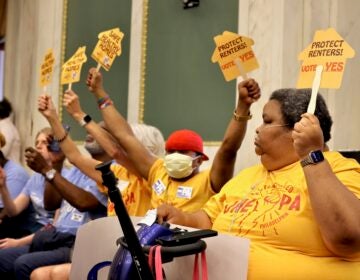Matthew Desmond on America’s eviction epidemic and housing as a nonpartisan issue

On Monday evening Matthew Desmond, author of “Evicted: Poverty and Profit in the American City,” spoke to an overflowing room at the University of Pennsylvania’s College Hall. The lecture sounded a rallying cry for a national right to housing, in the shadow of rapid political changes that call the feasibility of that goal into doubt.
The lecture followed the story of Arlene, head of one of the families Desmond traces in his award-winning book, as she tries to steer her two young sons through a series of evictions. Desmond’s lecture put a face on the staggering affordable housing crisis facing America
The numbers are stark. The majority of renting families in the United States spend at least half their income on rent, while one in four spends more than 70 percent. This affordability crisis creates chronic instability. If tenants make one mistake or suffer one setback they’ll end on the street, which creates constant churn in poor neighborhoods, destabilizing family and neighborhood life, making it extremely difficult to do well in school or hold down a job.
“There are kids all over this country who aren’t eating…because the rent eats first,” said Desmond.
In his research Desmond found that one in every eight renters in Milwaukee had been involuntarily displaced in the previous two years. These evictions reinforced poverty’s cruel dictates, driving tenants into poorer and more violent neighborhoods. One of his studies found that violent crime rates went up in neighborhoods with high eviction rates.
To guard against this community-destroying epidemic, he promoted a housing voucher program available to anyone under the poverty line. Desmond also emphasized how valuable the right to legal aid for renters would be in landlord-tenant court—where few tenants have a lawyer, but most landlords do—which is an issue Councilwoman Helen Gym’s office will soon be holding hearings on.
Although last week’s election did not feature in Desmond’s lecture, the radical shift in housing policy expected under President Donald Trump haunted the event.
“When we scheduled this before the election, we did not anticipate the context in which this would be taking place,” said Mark J. Stern, co-director of Penn’s Urban Studies Program. “I’m pretty sure as we look forward, interactions of race, social class, and predation are going to be an important issue in the coming days.”
Desmond’s lecture is a part of Penn Urban Studies’ tradition of having an eminent urbanist deliver an annual public lecture while integrating that individual’s work into the syllabus of the senior class.
Many questions from the crowd focused on the wonky aspects of Desmond’s policies. Audience members asked why the book didn’t recommend a rent cap (because it is politically unwinnable in any American city) and whether universal housing vouchers would drive up rents everywhere (the research doesn’t seem to bear that out).
But later the questions began to probe the current political situation, where Republicans control most levers of power. Desmond himself remained studiously non-partisan throughout, couching his arguments in deeply moral but observational language.
“I was struck by the non-partisan tenor of your presentation, particularly your appeal to the common good of housing,” said writer and urban anthropologist Elizabeth Greenspan. “I just feel that the elephant in the room is the election. How much have you spoken to conservative groups, what has the response been, and what do you think the steps moving forward will be given the political realities we are facing.”
Throughout this highly politicized year, Desmond’s writings and speeches have sought common ground across the ideological spectrum. He has lobbied both Democratic and Republican lawmakers about the eviction crisis. The J. Ronald Terwilliger Foundation for Housing America’s Families promoted his work heavily, giving copies to Republican Congressional representatives including Speaker of the House Paul Ryan. Desmond has also met with Democratic senators like Sherrod Brown and Elizabeth Warren. As a result, they co-wrote a letter with fellow senators that prompted HUD to issue guidelines against the nuisance laws that Desmond denounces in his book for bringing evictions down upon women who call the police because of domestic abuse.
Desmond’s bipartisan bona fides will be reinforced this Friday, when he will be the keynote speaker of the Terwilliger foundation “Housing America’s Families Forum” at the George W. Bush Institute in Dallas.
Over the weekend CityLab reported that the executive director of the Terwilliger foundation, Pamela Hughes Patenaude, is one of three candidates being considered for the lead job at HUD. “She gets it,” Desmond told PlanPhilly. “There are people who are working incredibly hard on these issues and she’s one of them.”
During the campaign President-elect Donald Trump, like the other Republican nominees, did not release a housing policy platform. On the website of his victorious campaign, housing is not listed as one of the issue areas in the “Policies” section (nor is it mentioned in the section on infrastructure).
“I’m still processing the election, working it out, but this isn’t a partisan issue,” said Desmond in response to Greenspan’s question. “There is ignorance on both sides of the aisle and there’s good will and work on both sides of the aisle. One thing the election has taught us is that we need to be better in tune with folks with different kind of politics. Especially because, with housing issues, it’s impossible to get anything major done without bipartisan support.”
But Desmond also said that housing advocates must remain vigilant in the months and years ahead, especially in regards to HUD’s budget. He noted that Reagan cut the department’s budget authority by 60 percent over the course of his tenure. This badly battered Philadelphia and other big cities and humbled a once mighty bureaucracy that had been second only in budgetary size to the Department of Defense.
Another audience member told Desmond that it seemed as though his book tried to challenge the narrative of poverty in America, and questioned how that resonated in the current political environment. “You are saying with this book that it’s not the poor’s fault that they are poor and the narrative is different than that at the US at this time,” the man said.
Desmond reported that he’d only had one aggressive respondent while he’s been promoting the book in across the country. It occurred in Kansas City at a public library, where an older white man in a navy-blue blazer approached the microphone.
“He said these people, they don’t deserve anything, all they deserve is to be sterilized,” recalled Desmond. “But he got boo’d and then a lot of people who had been evicted lined up and offered their stories. And I have not received another comment like that.”
Desmond’s dialogue touched on the diversity of housing crises, from the sweeping gentrification of New York and Boston to the weaker market cities like Philadelphia, which still suffer from large scale divestment. He also cited Jane Jacobs a couple times, noting that the eyes on the street dynamic requires the very social fabric that is torn apart by the churn of evictions in poor neighborhoods.
Then he ended, as ever, on a call to action.
“This degree of inequality, this needless social suffering and denial of basic rights, this isn’t us,” said Desmond. “This doesn’t have to be us. By no American value is this situation justified. There is no ethical code or piece of scripture or holy teaching that can be summoned to defend what we’ve allowed our cities to become.”
WHYY is your source for fact-based, in-depth journalism and information. As a nonprofit organization, we rely on financial support from readers like you. Please give today.







